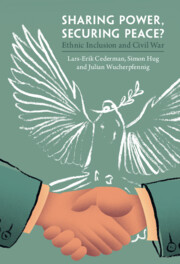Book contents
- Frontmatter
- Contents
- Figures
- Tables
- Preface
- 1 Introduction
- Part I Theories and Concepts
- Part II Analyzing the Effect of Power Sharing on CivilWar
- 4 Power Sharing and Civil War: Data and Baseline Models
- 5 Contrasting Formal Power-Sharing Institutions and Practices
- 6 Endogenizing Governmental Power Sharing and Its Effect on Civil War
- 7 The Strategic Logic of Governmental Power Sharing and Civil War
- 8 The Effect of Territorial and Governmental Power Sharing on Civil War
- 9 The Strategic Logic of Territorial Power Sharing, Secession and Civil War
- Part III Power Sharing and Civil War in Time and Space
- Bibliography
- Index
7 - The Strategic Logic of Governmental Power Sharing and Civil War
from Part II - Analyzing the Effect of Power Sharing on CivilWar
Published online by Cambridge University Press: 23 June 2022
- Frontmatter
- Contents
- Figures
- Tables
- Preface
- 1 Introduction
- Part I Theories and Concepts
- Part II Analyzing the Effect of Power Sharing on CivilWar
- 4 Power Sharing and Civil War: Data and Baseline Models
- 5 Contrasting Formal Power-Sharing Institutions and Practices
- 6 Endogenizing Governmental Power Sharing and Its Effect on Civil War
- 7 The Strategic Logic of Governmental Power Sharing and Civil War
- 8 The Effect of Territorial and Governmental Power Sharing on Civil War
- 9 The Strategic Logic of Territorial Power Sharing, Secession and Civil War
- Part III Power Sharing and Civil War in Time and Space
- Bibliography
- Index
Summary
In this chapter, we explore an actor-centric approach that emphasizes strategic interaction and offers an alternative to IV-estimation to pursue the evaluation of Master Hypothesis 4. We proceed in two steps. First, we introduce a simple formal model that captures the most important strategic dimension and highlights what is crucial for reverse causation: The conditions under which governments are likely to share power depending on the level of threat posed by a domestic challenger. As we have shown in Chapters 3 and 6, previous research on the origins of power sharing highlights either government incentives for the co-optation of threatening challengers through power sharing arrangement or risk-diversion by means of exclusion so as to avoid perilous infighting. Rather than favoring either consideration at the expense of the other, the model presented here unifies these mechanisms and shows that both have their place - depending on the challenger's level of threat as well as the government's ability to provide credible guarantees. In a second step, the chapter provides a novel statistical estimator that closely mirrors the strategic logic of the theoretical model, but also accounts for the selection on unobservables. Applied to data at the level of ethnic groups around the globe since World War II, the model offers strong evidence that governments do indeed strategically use power sharing as a way of managing the risk of conflict. In short, power sharing is systematically endogenous to conflict as suggested by Master Hypothesis 4. Moreover, the results reaffirm that power sharing systematically causes peace, and that naïve analyses that do not account for endogeneity tend to underestimate this effect.
Keywords
- Type
- Chapter
- Information
- Sharing Power, Securing Peace?Ethnic Inclusion and Civil War, pp. 126 - 148Publisher: Cambridge University PressPrint publication year: 2022

